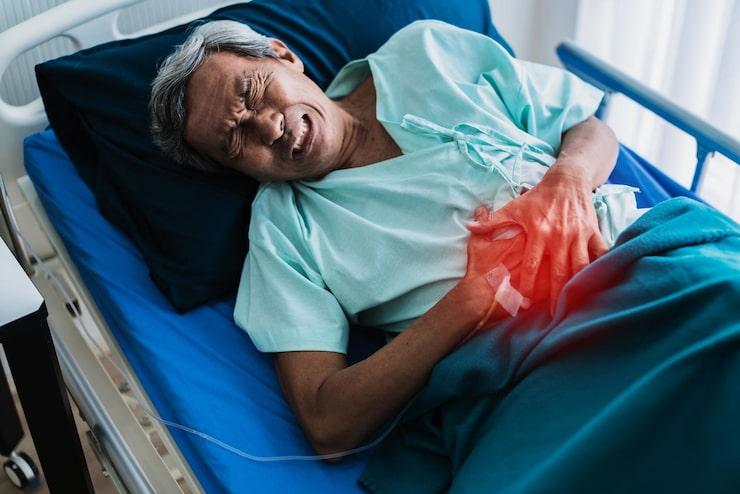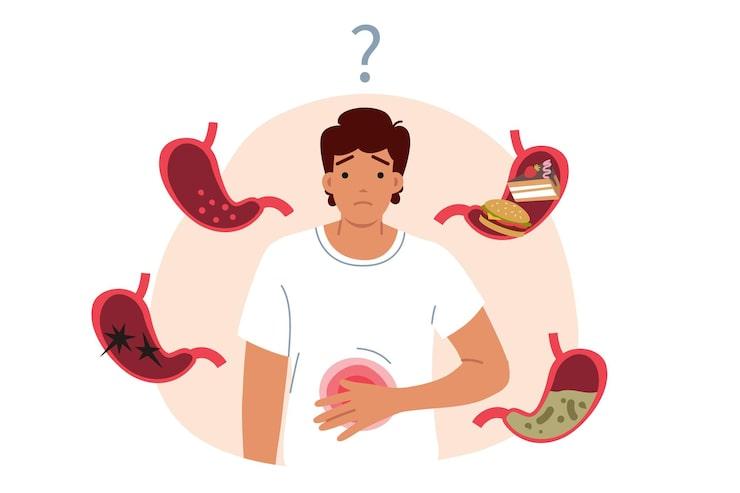Understanding Ulcers: What They Mean Depending on Where They Occur and How They Are Treated
man suffering from stomach ulcers
An ulcer can cause pain, burning, or discomfort in the stomach or on the skin. Ulcers form on the inside or outside of the body when the body's protective layer of tissue is damaged. The location of an ulcer can influence its causes, symptoms, and treatment options.
Our experienced gastroenterologists and specialists at Prakash Hospital in Noida can diagnose and treat all types of ulcers, regardless of their location: in the stomach, mouth, intestines, or on the skin. If you understand what ulcers are and how to treat them promptly, you can prevent complications and recover more quickly.
What are ulcers?
A sore or cut that appears on the skin or the outer lining of an organ is referred to as an ulcer. When the protective mucus layer that shields tissues from acids, bacteria, or friction breaks down, it exposes the tissue underneath, which can lead to inflammation, pain, and infection, resulting in considerable discomfort.
Ulcers can develop in various regions of the body, including the digestive tract, oral cavity, dermis, and lower extremities. The location of the ulcer determines its type and the necessary treatment.
Different types of ulcers and what they mean
stomach problems behind ulcers
Let's discuss the most common types of ulcers, their locations, causes, and primary signs that help identify them.
1. Stomach and small intestine ulcers (peptic ulcers)
Where they take place:
Peptic ulcers can happen on the inside of the stomach or the top of the small intestine (duodenum). They are divided into groups like this:
The lining of the stomach is where gastric ulcers happen
The first part of the small intestine is affected by duodenal ulcers.
- An infection with Helicobacter pylori (H. pylori) is a common bacterial cause.
- Taking NSAIDs (painkillers like ibuprofen or aspirin) for a long time.
- The body can produce too much acid due to stress or genetic factors.
- Smoking or drinking alcohol.
- Symptoms include stomach pain that feels like burning or aching, especially when the stomach is empty.
- Feeling sick or throwing up.
- Having a full stomach or an upset stomach.
- Not wanting to eat or lose weight.
- Stools that are dark or sticky indicate the presence of blood.
Treatment: a combination of antibiotics to get rid of the H. pylori infection.
- H2 blockers or proton pump inhibitors (PPIs) are used to lower the amount of acid made.
- Antacids can help with pain right away.
- You should change your lifestyle by not eating spicy foods, drinking alcohol, or smoking often.
- In severe cases, such as those with bleeding or a skin hole, surgery or endoscopic procedures may be necessary to repair the ulcer and control the bleeding.
2. Canker sores, which are also known as oral ulcers or mouth ulcers
When they take place:
Mouth ulcers are small, painful sores that appear on the inside of the lips, cheeks, tongue, or gums.
Causes: minor injuries from biting, braces, or dental work.
- Lack of nutrients in the body, especially folate, iron, or vitamin B12.
- Changes in hormones or stress.
- Food allergies, such as being allergic to spicy foods or citrus fruits.
- Viral infections, like the herpes simplex virus.
Symptoms: Small, round or oval sores with a red edge and a white or yellow center.
- You experience pain or a burning sensation when eating or talking.
- Nearby tissues get bigger.
- Most mouth ulcers typically resolve on their own within 7 to 10 days. However, if ulcers don't heal or recur, you may need to use topical antiseptic or corticosteroid gels to help manage pain and swelling.
- Taking extra vitamins and minerals to make up for what you don't get enough of.
- Keeping your mouth clean and not eating foods that make you sick.
- Suppose you have ulcers that last longer than two weeks. In that case, you should consult a specialist at Prakash Hospital, such as an ENT specialist or oral surgeon, to rule out any other potential issues, including infections or oral cancer.
3. Esophageal ulcers
When they happen:
Esophageal ulcers form on the lining of the esophagus, which is the tube that goes from the mouth to the stomach.
What causes it: Gastroesophageal reflux disease (GERD) occurs when acid keeps going back into the esophagus.
- Individuals with weakened immune systems are more susceptible to infections caused by bacteria, fungi, or viruses.
- Taking certain drugs, like NSAIDs or antibiotics, for a long time without drinking water.
- Pain or burning in the chest, especially when you eat.
- Dysphagia is the medical term for trouble swallowing.
- Heartburn or acid reflux.
- In extreme cases, you may feel sick or throw up blood.
- Esophageal ulcers are treated with drugs that lower stomach acid, such as PPIs.
- Antibiotics or antifungals can also help if the problem is an infection.
- Changing your lifestyle, such as eating smaller meals, avoiding late-night eating, and sleeping with your head elevated.
- Our gastroenterology team at Prakash Hospital in Noida utilizes advanced endoscopic evaluation to determine the severity of the ulcer and ensure it receives the appropriate care.
4. Skin ulcers
Where they happen:
When blood flow to a certain area is cut off or when pressure hurts the tissue, skin ulcers form. They are open sores on the skin.
Here are some common ones:
- Venous ulcers typically appear on the lower legs because blood flow is impaired or the veins are enlarged.
- Arterial ulcers occur when arterial disease obstructs blood circulation.
People who can't move around much and stay in one position for a long time often develop bedsores, also known as pressure ulcers.
Signs: Open cuts that take a long time to heal or don't heal at all.
- Swelling, redness, or fluid leaking out.
- Pain or soreness in the area that is hurt.
Treatment: Skin ulcers require wound care and circulation management, which may include regular cleaning and dressing of the wound.
- Use antibiotic creams or take antibiotics by mouth if you have an infection.
- Compression therapy for venous ulcers.
- Surgical debridement is the process of removing dead tissue.
- Changes to your lifestyle, such as elevating your legs, exercising, and managing your diabetes or high blood pressure effectively.
- Our wound care unit at Prakash Hospital utilizes advanced techniques for ulcer management to expedite wound healing.
5. Ulcers in the eyes (corneal ulcers)
Where they take place:
- The cornea is the clear front part of the eye where corneal ulcers happen.
- What causes eye infections? Most of the time, they are caused by bacteria or fungi.
- Not using contact lenses the right way.
- Injuries to the eyes or eyes that are too dry.
- The eye hurts a lot and is red.
- Seeing things that are blurry or being sensitive to light.
- A white spot on the cornea or pus.
- Antibiotic or antifungal eye drops to get rid of the infection.
- Drops that make it easier to move things.
- Not wearing contacts while healing.
- In very bad cases, a corneal transplant may be necessary to get vision back.
- At Prakash Hospital, our eye doctors are very good at finding and treating eye ulcers. They ensure your vision stays clear and that you recover quickly.
Things that can go wrong if you don't treat ulcers
ulcers causing pain and discomfort
If ulcers are not treated, they can cause serious health problems, such as internal bleeding or perforation (especially in peptic ulcers).
- Very bad infections or pus-filled bumps.
- The organs that are hurt get scarred and smaller.
- Corneal ulcers can cause loss of vision.
- Identifying and addressing these issues early is the most effective way to prevent them and maintain long-term health.
Simple but useful ways to stop ulcers
- Before taking too many painkillers (NSAIDs), talk to your doctor.
- Stop smoking and drinking in excessive amounts..
- To manage stress, try practicing relaxation techniques and engaging in regular physical activity.
- Eat a healthy diet that includes a variety of fruits, vegetables, and fiber-rich foods.
- If you've had ulcers before, be sure to drink enough water and consult a doctor regularly.
When to See a Doctor
If your stomach hurts or burns and doesn't go away, you should visit Prakash Hospital in Noida.
- Stools that are dark or bloody.
- Sores that keep coming back on the skin or in the mouth.
- Having trouble swallowing or losing weight for no reason.
- Eyes that hurt or are red and don't get better.
We have a team of experts, including gastroenterologists, dermatologists, ENT doctors, and ophthalmologists, who collaborate to determine the causes of ulcers and their locations.
Conclusion
At first, ulcers may seem like minor problems, but they can be signs of more significant health issues that require further investigation. Knowing where an ulcer is located and understanding its significance can help you choose the right treatment and prevent more serious problems.
Prakash Hospital in Noida can fully diagnose and treat ulcers. We utilize the latest technology, create personalized care plans for each patient, and collaborate as a team. No matter what type of ulcer a patient has, whether it is peptic, mouth, skin, or eye, our team ensures they receive the best care possible to achieve a full recovery.



